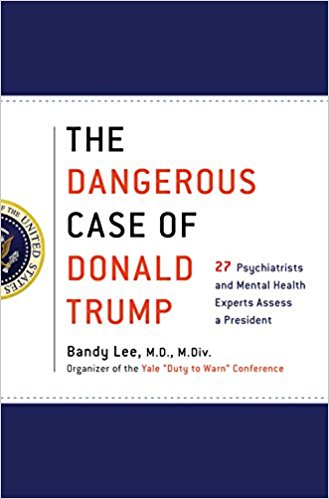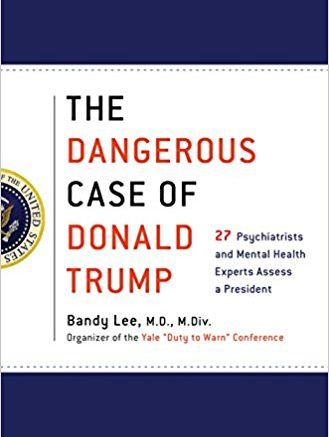
By Andrew Spitznas
Patheos (10/1/17)
Like a bulging medical file for a chronically hospitalized ICU patient, every week sees new additions to the folders of evidence for Donald Trump’s diseased mind and his mental unfitness for the presidency. This past week, in the “History of Present Illness” section, it was his lack of empathy and blame shifting for the abominable response to hurricane-ravaged Puerto Rico. For “Past Medical History,” it was the unearthed recording of a conversation with trashmaster Howard Stern, wherein Trump appallingly described his neglect and disgust towards an elderly man bleeding on Mar-A-Lago’s floor. (Just as appalling is Trump’s unawareness that his response should be cause for shame.)
So, what exactly is psychologically wrong with this man, and what makes him dangerously unfit for public office? In this time of Trump-induced peril, is it still ethical for the American Psychiatric Association (APA) to gag its members’ speech against the president, under their Goldwater Rule of 1973? And more broadly, what are the psychological effects of a Trump presidency, and what does Trump’s rise to power say about this country?
“It does not seem to me that the German Psychiatric Association of the 1930s deserves any honor or credit for remaining silent during Hitler’s rise to power.” – James Gillgan, psychitrist.
For answers to these questions, there is no better place to turn than The Dangerous Case of Donald Trump: 27 Psychiatrists and Mental Health Experts Assess a President. Edited and brought together by Bandy Lee, the psychiatrist who organized Yale’s “Duty to Warn” conference earlier this year, the responses contained in this book’s 360 pages are detailed, insight-rich, and well-reasoned.
Lee has assembled a dugout full of power hitters for this volume, with experts coming from esteemed institutions such as Harvard, Hopkins, NYU, UNC-Chapel Hill, and UCSF. Among the contributing psychiatrists, psychologists, and psychotherapists are leaders in the field like Judith Herman, the psychiatrist author of a seminal work on PTSD, Trauma and Recovery; Philip Zimbardo, the psychologist who conducted the Stanford prison experiment; and Robert Lifton, the psychiatrist famed for his studies of Nazi doctors and Hiroshima survivors. (If only Trump’s cabinet contained such luminous talent, we could feel much safer.)
A precise and elegant prologue by Lee and Herman lays the ground rules for the three sections that follow. In it, the authors admit the impossibility of giving Trump a definitive diagnosis in the absence of clinical interviews and testing. They also posit that the APA’s Goldwater Rule should only be broken in the event of an emergency, and this is one such time. Lest there be any doubt, they conclude with the 27 authors’ unanimous conviction that “anyone as mentally unstable as Mr. Trump simply should not be entrusted with the life-and-death powers of the presidency.”
Part One (The Trump Phenomenon) focuses upon the symptoms and behaviors that render the president imminently dangerous. The various authors in this section argue that Trump exhibits impairments consistent with multiple diagnoses, including Narcissistic Personality Disorder, Antisocial Personality Disorder (or sociopathy), paranoia, hypomania, and possibly dementia.
The clinicians do an excellent job, assembling a greatest hits collection and several B-sides of Trump’s deranged statements and abhorrent behaviors to make their cases. Their assessments span the president’s entire lifetime, though with emphasis primarily upon his words and deeds while campaigning and now as president. Their summation is a horrifying trek down Memory Lane and utterly damning in its totality.
The only chapter that I found unpersuasive was psychologist Michael Tansey’s discussion of Delusional Disorder, a rare condition by comparison to those already mentioned. To use a time-worn clinical aphorism, when you hear hoof beats outside your window, it’s usually a horse and not a zebra.
Far more compelling is psychologist John Gartner’s overview of malignant narcissism, which appears to tidily encapsulate the Man in the Red Cap. A diagnostic construct originally developed by the influential psychoanalysts Erich Fromm and Otto Kernberg (both refugees of Nazi Germany), malignant narcissism is comprised of four essential components: Narcissistic Personality Disorder, antisocial behavior, paranoid traits, and sadism.
Before I move along and discuss Part Two, I’ll go ahead and respond to what I anticipate will be a primary criticism of The Dangerous Case of Donald Trump. I expect that many reviewers and readers will argue that the multiplicity of possible diagnoses presented here weakens the case for Trump’s mental impairment.
To answer this, I’ll play my “psychiatrist with over 20 years of clinical experience” card, and offer a four-fold reply. First, just as often as not, patients meet the criteria for more than one diagnosis. Second, our main tool for diagnosis in psychiatry – the Diagnostic and Statistical Manual of Mental Disorders, Fifth Edition (DSM-5) – is far from perfect, an overly reductionist approach to the diversity and malleability of human behavior. But as a former Secretary of Defense once said, we go to war with the army we have, not the army we wish we had. …
*****
Petition: Mental Health Professionals Warn Trump Is Dangerously Mentally Ill & Must Be Removed
By John Gartner PhD
Change.org
We, the undersigned mental health professionals (please state your degree), believe in our professional judgment that Donald Trump manifests a serious mental illness that renders him psychologically incapable of competently discharging the duties of President of the United States. And we respectfully request he be removed from office, according to article 4 of the 25th amendment to the Constitution, which states that the president will be replaced if he is “unable to discharge the powers and duties of his office.”
If you are a mental health professional fulfill your professional ethical responsibility duty to warn and sign on to the petition HERE.

